.
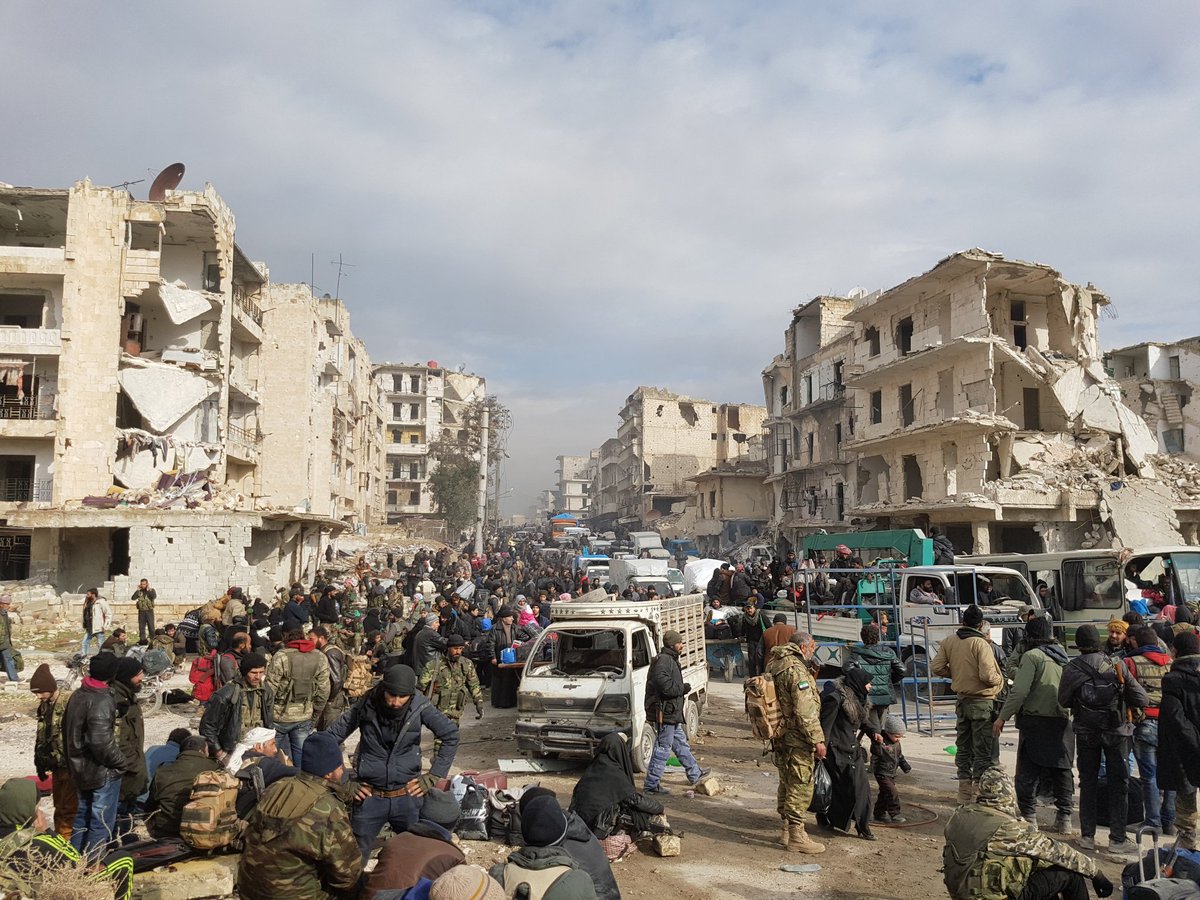
The evacuation convoy was attacked yesterday by Assad's mercenaries. #Aleppo #STOP_THE_GENOCIDE: image via Ismail Alabdullah @ishmael12345611, 17 December 2016
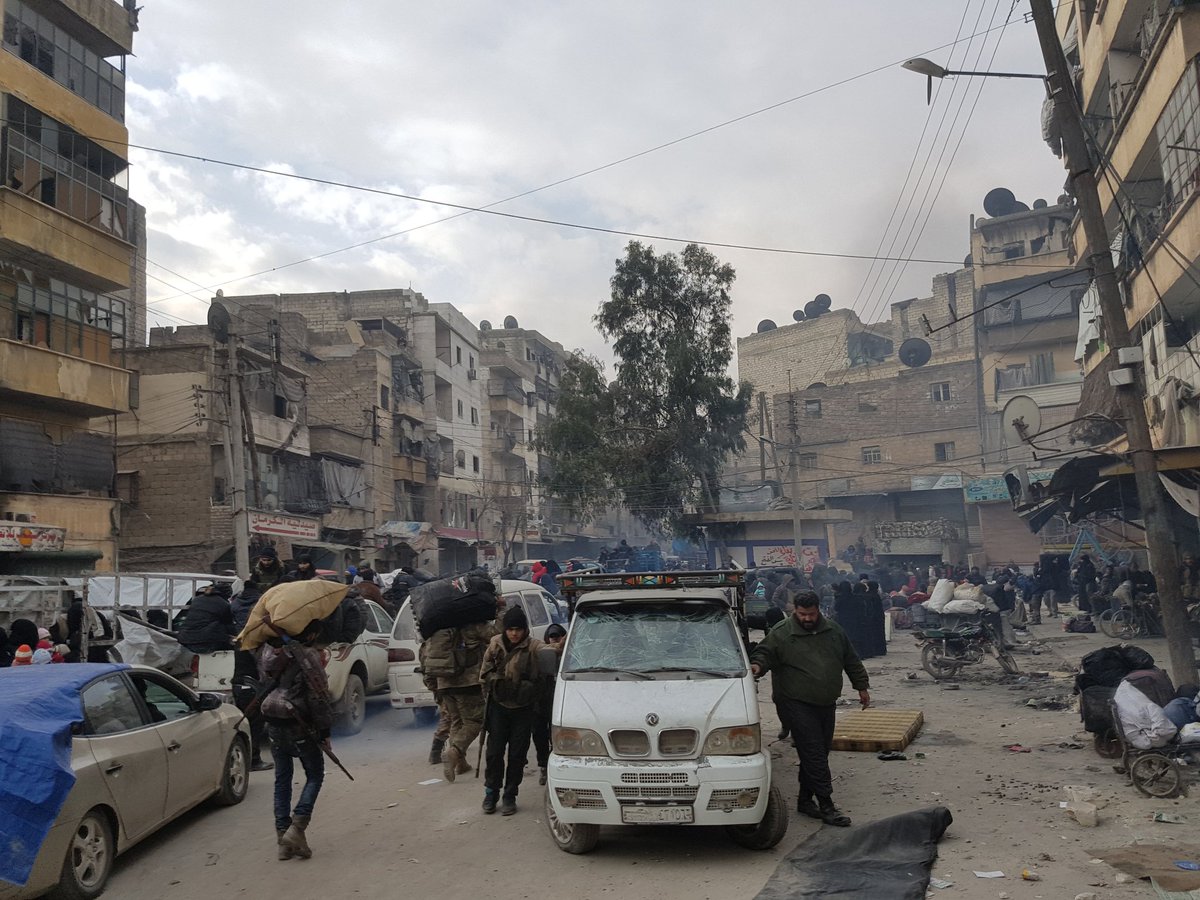
Up till now the operation the forced displacement is stopped and fifty thousands people are trapped: image via Ismail Alabdullah @ishmael12345611, 17 December 2016
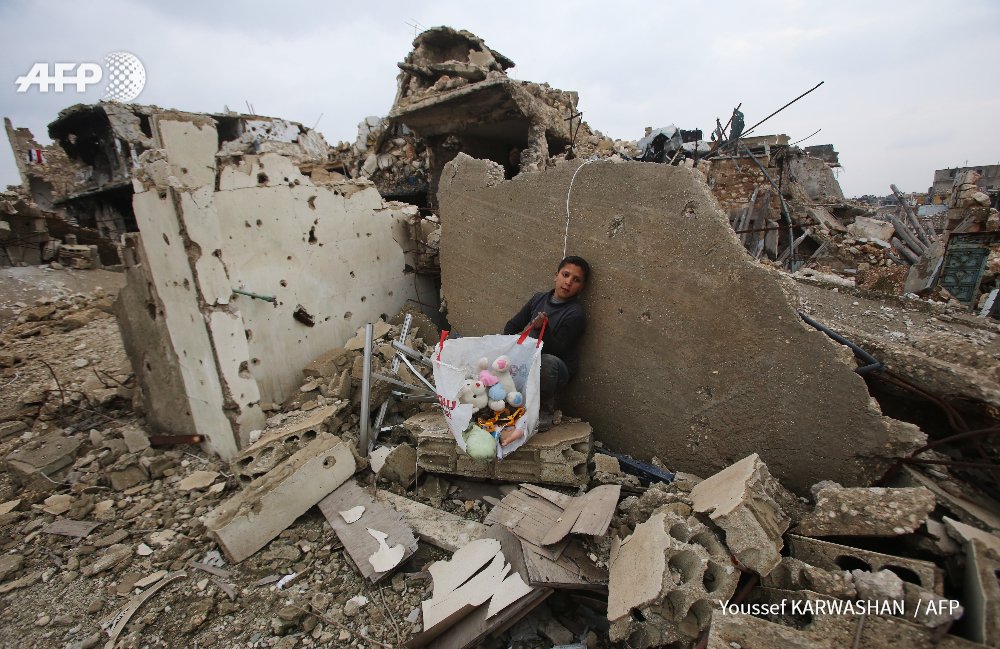
SYRIA - A boy sits with belongings he collected from the rubble of his
house in Aleppo's Al-Arkoub neighbourhood. By Youssef Karwashan #AFP:
image via Frédérique Geffard @fgeffardAFP, 17 December 2016

Crying men to get out of Aleppo: image via baraa al halabi @baraaalhalabi, 17 December 2016
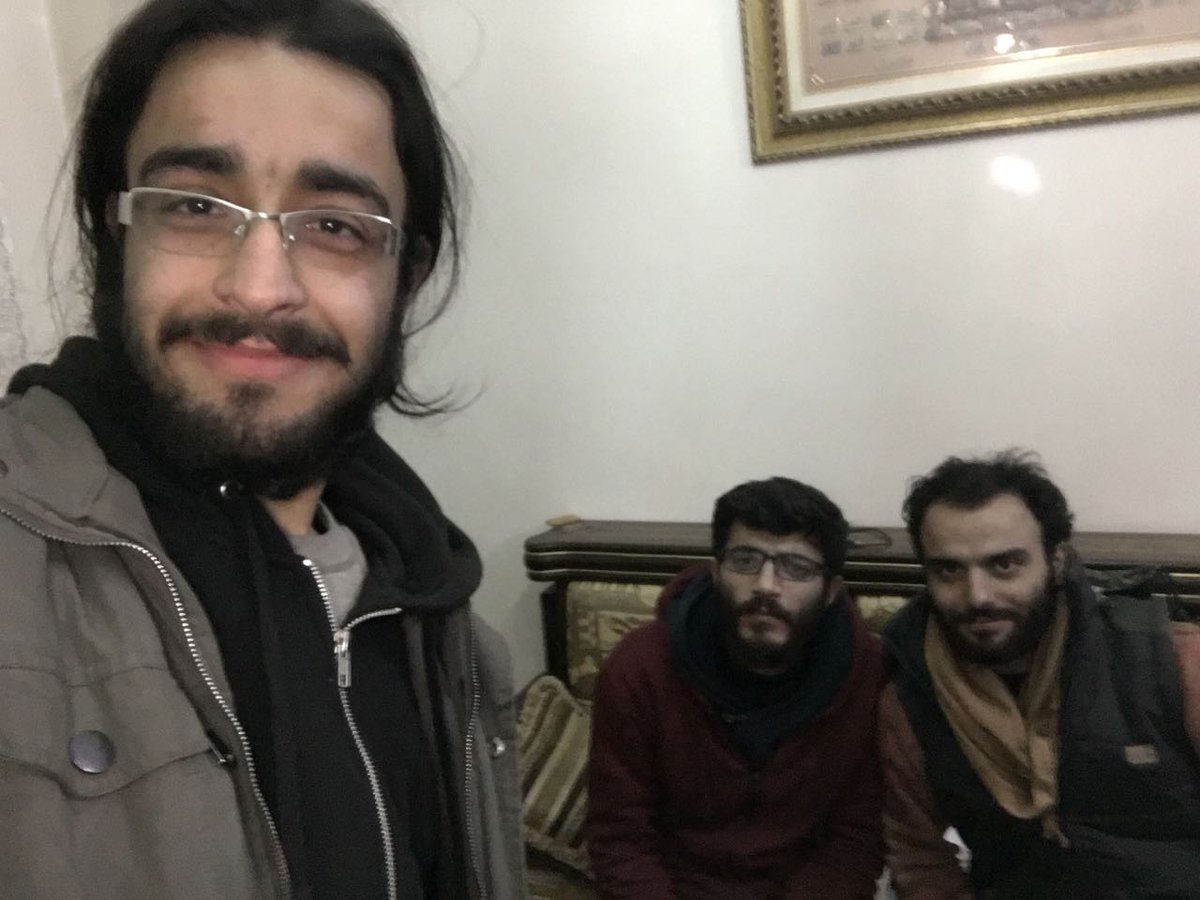
Our
last hours in east #Aleppo.
Where we lived, hoped and covered regime and Russian war crimes together
with @montheretaky @ShSam94: image via Zouhir AlShimale
@ZouhirAlShimale, 17 December 2016
Zouhir Al-Shimale: Notes from a journalist living under siege, via Middle East Eye, 17 December 2016
Friday 16 December
About 800 tried to leave from the evacuation point, so there was a Syrian Red Crescent observer waiting for them.
They were about 25 cars, including one ambulance.
All of them were civilians and injured people, mostly women and children... the buses didn’t arrive.
There was big delay. Waiting from the morning for 6 to 7 hours. It was a huge delay.
After this, they arrived from the regime's side and it was total chaos.
Militias and military guys surrounded them and asked them to exit their cars and kneel on their ground.
They asked the men to do this, not the women. They put them on the ground and kicked them so brutally.
They took everything, money and mobile phones. Everything they had, it was gone.
Having beaten them so badly, they killed four people, total extermination.
After
the attack, the people in the crowd, the rest of the 800 people, went
totally crazy, messed up, as they were told to leave with no
explanation.
Their possessions were taken and they were told to get out.
The
militias took many hostages, we don’t how many, but as they got there
they started shooting in the air towards people, towards the east and
making trouble for the people who were close to the firing.
They
had heard that the regime was advancing, attacking the east and all of
it, so they were running very fast trying to save their lives.
You
can imagine 16,000 people in the street and maybe many gathering in a
small area, running at the same time with cars surrounding them and yes,
there were no injured in this case but the chaos was really
unbelievable.
Everybody, after this chaos, they all returned home, totally messed up and shocked.
Saturday 17 December
It was a nightmare as well today. We were just waiting for hours in the morning to evacuate.
After
we got through the evacuation process we were waiting for hours and
hours and we ended up being shot at and being forced to leave.
2pm
Here we are in the second day of evacuation, trying to reach the evacuation point where many of the families are.
We are in the Sukkari area, where it is not quite as overcrowded as it was yesterday
You can see how many people are on the street. Not overcrowded.
We are in the Sukkari area, where it is not quite as overcrowded as it was yesterday
You can see how many people are on the street. Not overcrowded.
The city is still not empty because the buses have not entered yet and we are waiting.
Because we are waiting and now its around half past two we are still waiting for the buses come.
Maybe the last day here in the Sukkari area.
People are just waiting.
Because we are waiting and now its around half past two we are still waiting for the buses come.
Maybe the last day here in the Sukkari area.
People are just waiting.
9pm
Still waiting, but I’m fine today.
It was really exhausting, I finally got some sleep but it was freezing. I had a meal even if it was very little food.
Yes
I can still carry on and be strong for the last hours and maybe
tomorrow. I’m thinking that maybe we’ll be let go, inshallah.
Let's
keep praying for us and this nightmare to end. Its really unbelievable,
how freezing cold it is. People don’t have any source of heat or fire
to keep them warm.
I never expected to go so viral, but my tweets
are being retweeted loads by people from around the world. Please, keep
praying for us during this time.
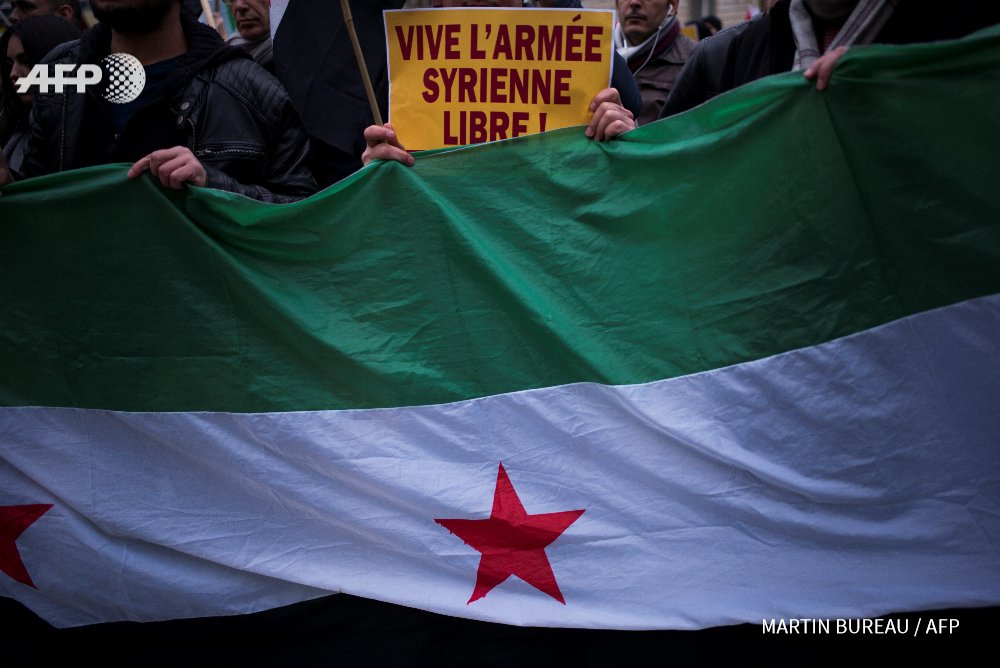
FRANCE - Protest of Syrian demonstrators against Iranian involvement in Aleppo's siege - Read "long live Free Syrian Army". By @MartinBureau1: image via Frédérique Geffard @fgeffardAFP, 17 December 2016
Yesterday at night people in the streets was burning there clothes to have some heat. #Aleppo: tweet via Malek Alshemali @MalekAlshemali, 17 December 2016
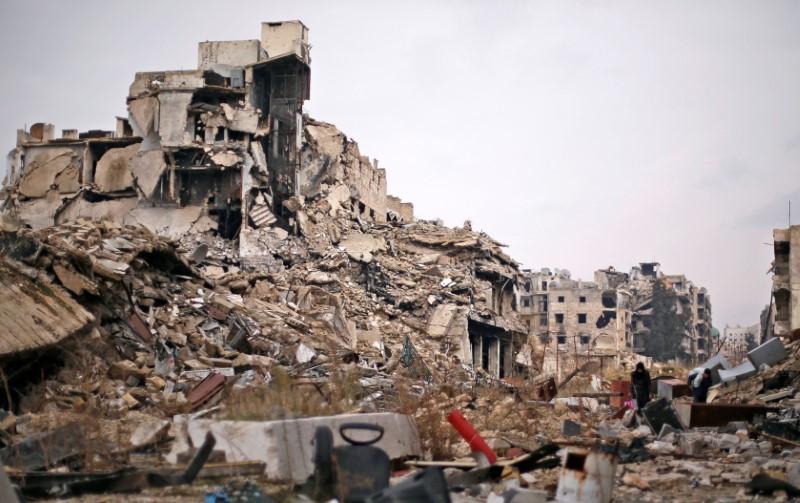
Syria government, rebels working to secure Aleppo evacuation deal: image via Reuters Top News @Reuters, 17 December 2016
Syria government, rebels working to secure Aleppo evacuation deal: Laila Bassam in Aleppo and Lisa Barrington and Tom Perry in Beirut, Stephanie Nebehay in Geneva, Suleiman al Khalidi in Amman and Mohamed el Sherif in Cairo, Reuters, |
A Syrian rebel official and a government official said early on Saturday the evacuation of Aleppo would resume and the two Shi'ite villages would be evacuated, as well as the wounded from two towns near the Lebanese border and east Aleppo.
But sources said negotiations between pro-government and opposition forces as well as their international backers, were still going on to finalize how the evacuations would take place and how many people would leave.
The chaos surrounding the evacuation reflects the complexity of Syria's civil war, with an array of groups and foreign interests involved on all sides.
Aleppo had been divided between government and rebel areas in the nearly six-year-long war, but a lightning advance by the Syrian army and its allies began in mid-November following months of intense air strikes, forcing the insurgents out of most of the rebel-held territory within a matter of weeks.
A senior Syrian rebel official from the powerful Ahrar al Sham group involved in the talks on Saturday said the deal was being held up by Iran and its allied Shi'ite militias which were insisting people be allowed to leave the besieged Shi'ite villages of Kefraya and al-Foua before allowing the Aleppo evacuation to proceed.
"Iran and its sectarian proxies are using the humanitarian situation of our people in besieged Aleppo and preventing civilians from leaving until the evacuation of their groups in al-Foua and Kefraya," Munir Sayal, the head of the political wing of the movement, told Reuters in a telephone interview.
Al Farouk Abu Bakr, the head rebel negotiator inside Aleppo charged with negotiating on their behalf, earlier said an agreement was reached that included the two Shi'ite villages as demanded by Iran. But he said later that Tehran had once again obstructed a deal.
As darkness fell on Saturday afternoon and temperatures began to fall below freezing, there was no sign the evacuation was happening. A resident in Aleppo told Reuters that nobody had left the rebel-held enclave and no buses had entered. He also said he had heard gunfire near where people were to wait for the buses.
The International Committee of the Red Cross (ICRC) said thousands of cold, scared and injured people were still in east Aleppo waiting to leave. It said it had received some indications that a deal would be reached soon.
The Syrian government official, part of the team negotiating the evacuations, said: "It was agreed to resume evacuations from east Aleppo in parallel with the evacuation of (medical) cases from Kefraya and al-Foua and some cases from Zabadani and Madaya."
The towns of Madaya and Zabadani are blockaded by pro-government forces.
The operation to evacuate fighters and civilians from the last opposition-held area of Aleppo was suspended on Friday, its second day, after pro-government militias demanded that the wounded also be brought out of al-Foua and Kefraya, and protesters blocked a convoy on the road out of Aleppo.
Another Free Syrian Army official Zakaria Malhafji said that he expected the Aleppo evacuation to resume on Sunday after reaching an agreement that also includes simultaneous evacuation from the two Shi'ite villages.
"Tomorrow morning the evacuation from Aleppo will begin again", Malhafji told TV news channel al-Arabiya al Hadath.
BEATEN AND ROBBED
Numerous activists, rebels and east Aleppo residents shared reports and videos of people fleeing amid chaos, the sound of shooting, being detained and returning home badly beaten and robbed of their possessions near a checkpoint as they tried to leave the city on Friday.
Rebels said the previous evacuation deal was breached by pro-government, Iran-backed militias who detained "hundreds" of people trying to leave, leading to some deaths. A Syrian military source denied this, but said a convoy trying to leave was sent back.
"Now we are working on international guarantees to guarantee the safety of those who leave Aleppo so that such violations are not repeated," Syrian rebel negotiator Abu Bakr told al-Arabiya from Aleppo on Saturday.
The Syrian Arab Red Crescent (SARC) and the ICRC said guarantees were needed to protect people.
"We're ready to resume facilitating the evacuation according to our humanitarian mandate. But we now expect all the parties on the ground to provide us with solid guarantees in order to keep the operation going," said Marianne Gasser, head of the ICRC in Syria.
NO EVACUATIONS ON SATURDAY
A military news outlet run by Hezbollah, an ally of Damascus, had said evacuation buses were heading to the two villages to complete the evacuations and said this could happen on Saturday.
But the Syrian Observatory for Human Rights, which monitors the war, said the evacuations in al-Foua or Kefraya, where it says there are around 20,000 people - of whom roughly 4,500 are pro-government fighters - was postponed and would begin on Sunday.
It was expected that 50 buses would take around 1,500 people, including wounded, to government-held areas.
The Observatory said 8,000 people, including some 3,000 fighters and more than 300 wounded, had left Aleppo in convoys of buses and ambulances in the evacuations that began on Thursday morning.
Rebel officials say the numbers evacuated are much lower, with no fighters having left.
The United Nations says around 30,000 people remain in rebel-held Aleppo, of whom a number would be taken to Idlib province, which is mostly controlled by hardline Islamist groups, and the rest would go to government-held city districts.
Idlib is already a target for Syrian and Russian air strikes, but it is unclear whether the government will push for a ground assault or simply seek to contain rebels there for now.
Turkey has said Aleppo evacuees could also be housed in a camp to be constructed near the Turkish border to the north.
OVERNIGHT BOMBING
The Observatory said war planes bombed insurgent-controlled areas west of Aleppo overnight and north of Aleppo on Saturday.
Syrian state media reported on Saturday that a number of fighters south of Damascus had surrendered their weapons to the state in the towns of Zakiya and al-Deirkheyba as part of local truces.
Through a series of so-called settlement agreements and army offensives, the Syrian government, backed by Russian air power and Iran-backed militias, has been steadily suppressing armed opposition in the suburbs of the capital.
Russian President Vladimir Putin, Syria's most powerful ally, said on Friday he was working with Turkish President Tayyip Erdogan to try to start a new round of Syrian peace talks aimed at securing a nationwide ceasefire.
A senior Syrian opposition leader, Riyad Hijab, said he was willing to attend the talks if the aim was to set up a transitional government. Assad has ruled out stepping down as part of a political solution to the war.
Aleppo, a once-flourishing economic center with renowned ancient sites, has been pulverized during the war that has killed more than 300,000 people, created the world's worst refugee crisis and allowed for the rise of Islamic State.
Even with victory for Assad in Aleppo, the war will be far from over. Insurgents still retain the rural stronghold of Idlib province as well as other territory in western, northern and southern Syria, while the jihadist Islamic State militant group holds swathes of the east and recaptured the ancient city of Palmyra earlier this week.
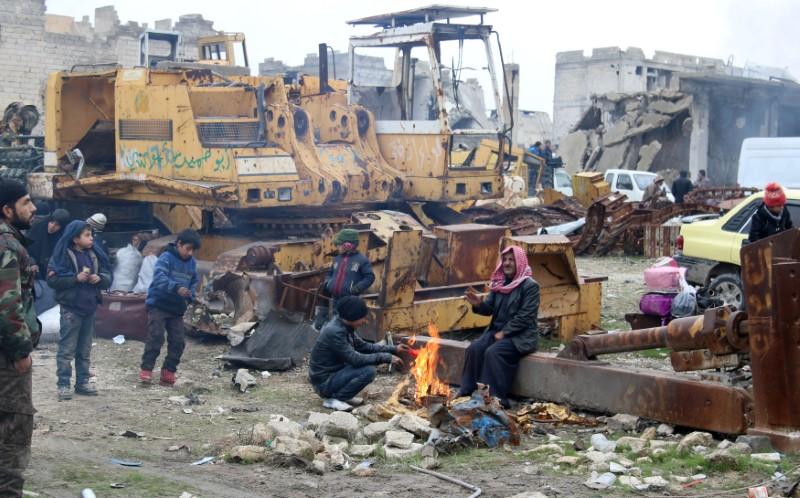
Syrian rebel group blames Iran for holding up Aleppo evacuation [photo: People wait to be evacuated from a
rebel-held sector of eastern Aleppo, Syria December 16, 2016.
REUTERS/Abdalrhman Ismail]: image via Reuters Top News @Reuters, 17 December 2016
Syrian rebel group blames Iran for holding up Aleppo evacuation: Suleiman Al-Khalidi | AMMAN, Reuters, |
A senior
Syrian rebel blamed Iran and its Shi'ite militias on Saturday of holding
up the evacuation of civilians trapped in the remaining rebel bastion
in Aleppo and urged Russia to live up to its commitment to implement the
deal.
Munir al Sayal, the head of the political wing of the Ahrar al Sham rebel group involved in negotiations over the deal, said Iran was insisting people be allowed to leave two besieged Shi'ite villages before letting the Aleppo evacuation happen. He said Russia was failing to restrain its ally.
"Iran and its sectarian proxies are using the humanitarian situation of our people in besieged Aleppo and preventing civilians from leaving until the evacuation of their groups in al-Foua and Kefyra," Sayal told Reuters in a telephone interview.
The operation to evacuate fighters and civilians from the last opposition-held area of Aleppo was suspended on Friday, its second day, after pro-government militias demanded that wounded people also be brought out of al-Foua and Kefraya, and protesters blocked the road out of Aleppo.
Sayal said Iranian-backed Shi'ite fighters led by Lebanon's powerful Hezbollah militia and other Iraqi Shi'ite groups were behind the detention of hundreds of people trying to leave on Friday, leading to some deaths before they were turned back, in an effort to disrupt the evacuation.
Numerous rebels and east Aleppo residents shared reports and videos of people fleeing the sound of shooting, being detained and returning home badly beaten and robbed of their possessions near a checkpoint as they tried to leave the city on Friday.
"These sectarian militias are responsible but we warn them the safety of our people in Aleppo is the priority and all options are open toward achieving that goal," said Sayal, whose armed group has a countrywide presence and is particularly active in northwestern Syria.
The Iranian-backed Shi'ite militias have played a leading role in the siege of rebel-held Aleppo and in the Syrian army's retaking of near full control of the city.
A picture of Iranian Revolutionary Guard commander Qassem Soleimani in a war-torn street in Aleppo was circulating on social media on Saturday by supporters. Reuters could not verify the authenticity of the photo.
Sayal said Moscow's assertion that most civilians had already been evacuated from Aleppo showed Russia was trying to renege on its responsibilities under the deal. Thousands of hungry and cold civilians needed to be evacuated as soon as possible, he said.
The agreement to evacuate the civilians and fighters was reached mainly between Russia, whose aerial bombing of Aleppo played a critical role in the defeat of the insurgents, and Turkey, which backs the mainstream rebels, acting as a go-between for the main insurgent groups.
"Russia has failed to restrain the sectarian Shi'ite militias in Aleppo to complete the deal and Moscow should abide by its commitments," Sayal said.
"There are still civilians in Aleppo who need to be evacuated in harsh weather conditions and Russian statements that besieged Aleppo is empty is absolving itself from following up on the agreement," he added.
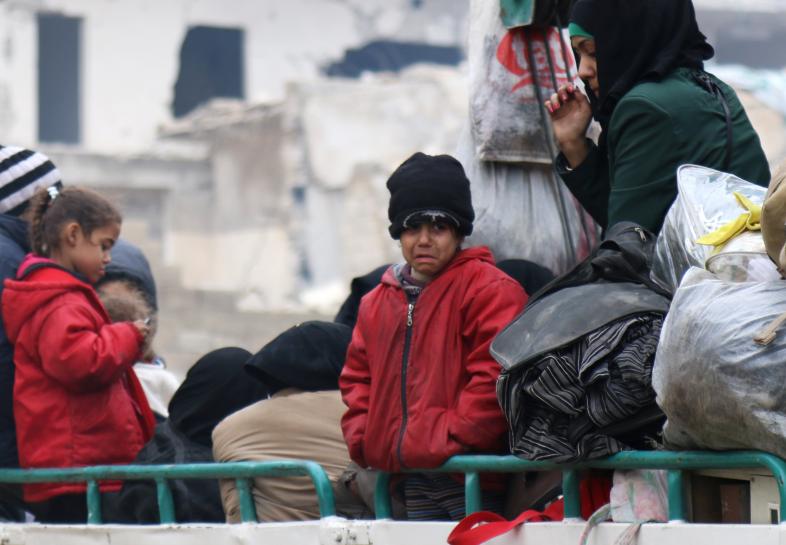
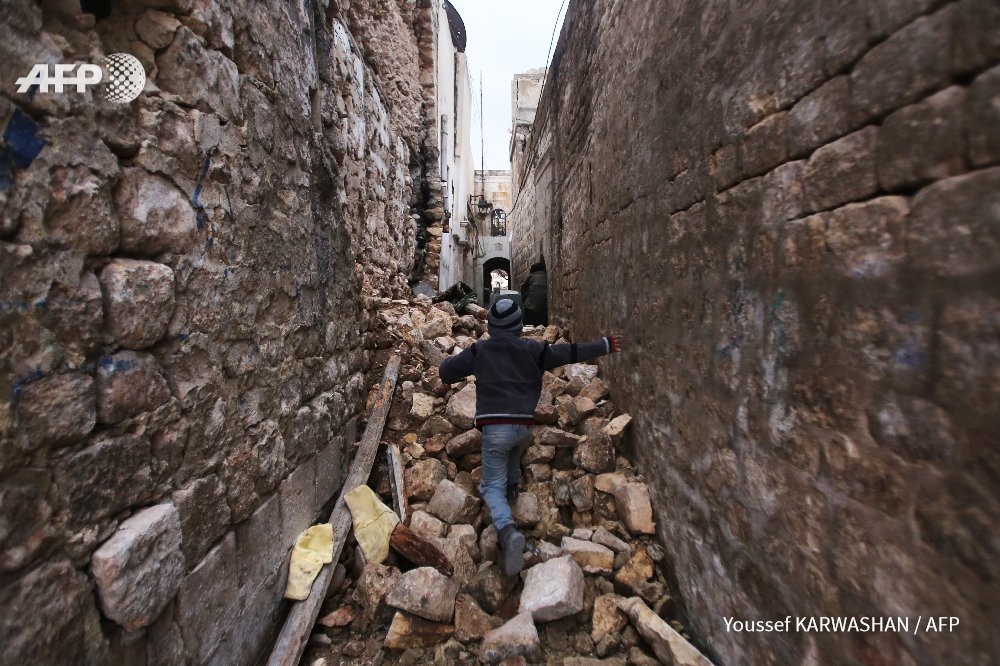
SYRIA - A boy makes his way through the rubble as he heads to his house in Aleppo's Dahret Awad neighbourhood. By Youssef Karwashan #AFP: image via AFP Photo Department @AFPphoto, 17 December 2016
Munir al Sayal, the head of the political wing of the Ahrar al Sham rebel group involved in negotiations over the deal, said Iran was insisting people be allowed to leave two besieged Shi'ite villages before letting the Aleppo evacuation happen. He said Russia was failing to restrain its ally.
"Iran and its sectarian proxies are using the humanitarian situation of our people in besieged Aleppo and preventing civilians from leaving until the evacuation of their groups in al-Foua and Kefyra," Sayal told Reuters in a telephone interview.
The operation to evacuate fighters and civilians from the last opposition-held area of Aleppo was suspended on Friday, its second day, after pro-government militias demanded that wounded people also be brought out of al-Foua and Kefraya, and protesters blocked the road out of Aleppo.
Sayal said Iranian-backed Shi'ite fighters led by Lebanon's powerful Hezbollah militia and other Iraqi Shi'ite groups were behind the detention of hundreds of people trying to leave on Friday, leading to some deaths before they were turned back, in an effort to disrupt the evacuation.
Numerous rebels and east Aleppo residents shared reports and videos of people fleeing the sound of shooting, being detained and returning home badly beaten and robbed of their possessions near a checkpoint as they tried to leave the city on Friday.
"These sectarian militias are responsible but we warn them the safety of our people in Aleppo is the priority and all options are open toward achieving that goal," said Sayal, whose armed group has a countrywide presence and is particularly active in northwestern Syria.
The Iranian-backed Shi'ite militias have played a leading role in the siege of rebel-held Aleppo and in the Syrian army's retaking of near full control of the city.
A picture of Iranian Revolutionary Guard commander Qassem Soleimani in a war-torn street in Aleppo was circulating on social media on Saturday by supporters. Reuters could not verify the authenticity of the photo.
Sayal said Moscow's assertion that most civilians had already been evacuated from Aleppo showed Russia was trying to renege on its responsibilities under the deal. Thousands of hungry and cold civilians needed to be evacuated as soon as possible, he said.
The agreement to evacuate the civilians and fighters was reached mainly between Russia, whose aerial bombing of Aleppo played a critical role in the defeat of the insurgents, and Turkey, which backs the mainstream rebels, acting as a go-between for the main insurgent groups.
"Russia has failed to restrain the sectarian Shi'ite militias in Aleppo to complete the deal and Moscow should abide by its commitments," Sayal said.
"There are still civilians in Aleppo who need to be evacuated in harsh weather conditions and Russian statements that besieged Aleppo is empty is absolving itself from following up on the agreement," he added.

Syrian rebel says new deal reached to secure Aleppo evacuation [photo:
A child reacts while waiting with others
to be evacuated from a rebel-held sector of eastern Aleppo, Syria
December 16, 2016.
REUTERS/Abdalrhman Ismail]: image via Reuters Top News @Reuters, 17 December 2016

SYRIA - A boy makes his way through the rubble as he heads to his house in Aleppo's Dahret Awad neighbourhood. By Youssef Karwashan #AFP: image via AFP Photo Department @AFPphoto, 17 December 2016
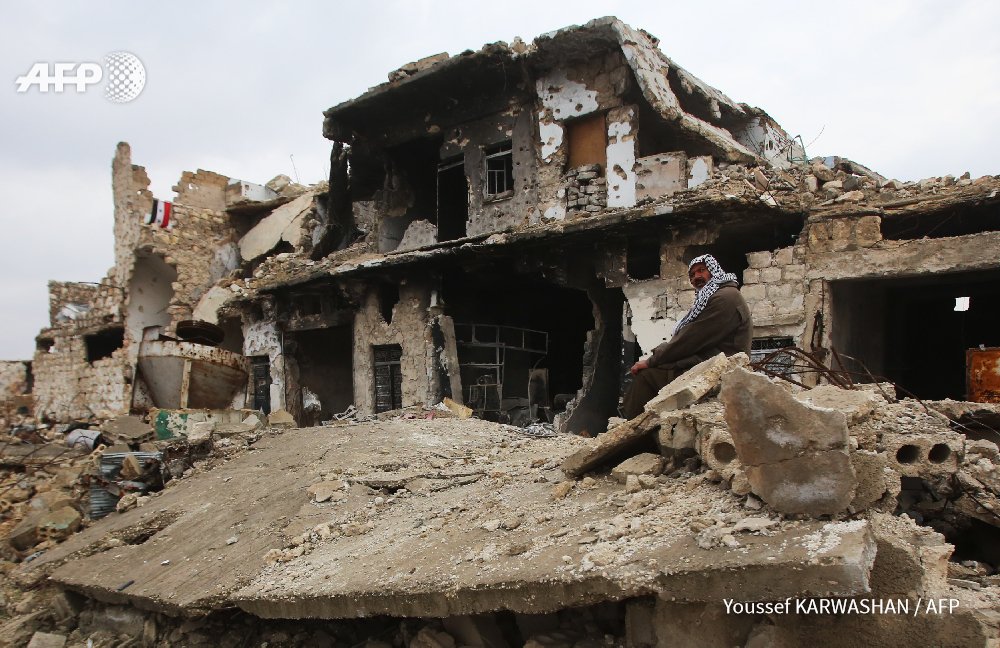
SYRIA
- A man sits on rubble of his house after pro-gov forces retook
Aleppo's Al-Arkoub neighbourhood from rebels. By Youssef Karwashan:
image via Frédérique Geffard @fgeffardAFP, 17 December 2016
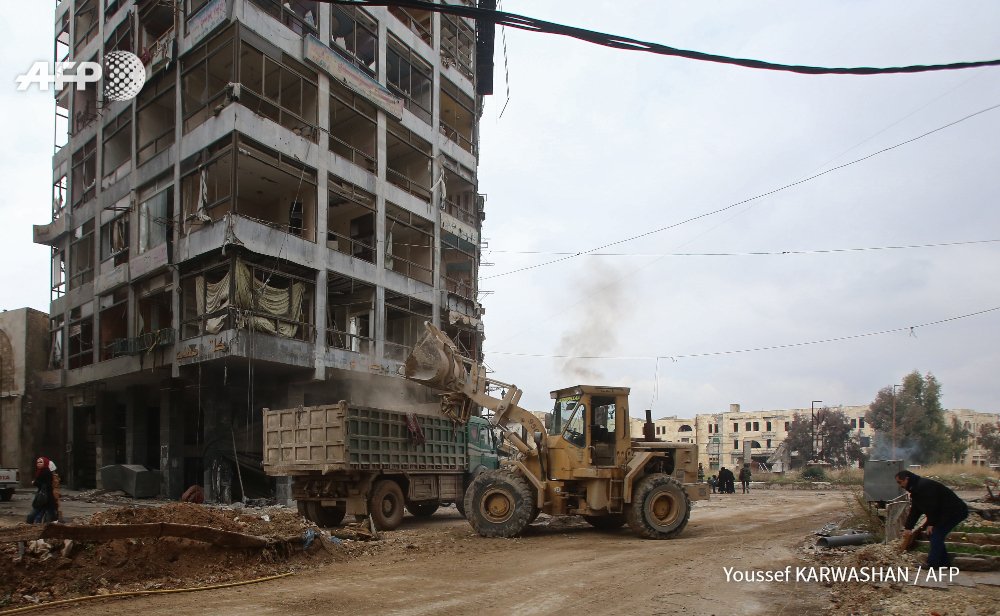
SYRIA - A bulldozer removes rubble from road as pro-gov forces re-open a street in Aleppo that was formerly barricaded. By Youssef Karwashan: image via Frédérique Geffard @fgeffardAFP, 17 December 2016
As the green surrender buses trickled out of Aleppo last Wednesday, Bashar al-Assad’s two biggest backers reacted very differently.
Russia, which had brokered the deal with Turkey to allow the refugees to leave, was urging the convoy on towards the countryside, where the first of the city’s final refugees were to be disgorged. Iran, on the other hand, was looking for ways to stop it.
To Moscow, the ceasefire was the pinnacle of Russia’s intervention in Aleppo, a moment when it could mount a new case as a peacemaker, after bombing opposition groups to capitulation for 15 months. To Tehran, allowing remaining civilians and rebel fighters to leave was a potential loss of leverage – at precisely the time that Iranian influence on the battlefield had started to eclipse that of Russia’s.
The divergence marked a seminal moment in the Syrian war; the mutual interest in securing Assad that had brought the two countries together had suddenly given way to a feud about who calls the shots now that the war is nearly won. The Russian air force matters little now. The Iranian revolutionary guards count for more.
Besieged populations have been bargaining chips throughout the six-year conflict, and Iran has played a direct role in turning the fate of cornered opposition communities into political victories that secure Assad and strengthen its own hand.
Allowing the last desperate holdouts of Aleppo to leave, without first seeking terms, was not in the Iranian playbook. And, within hours of Turkey and Russia announcing a deal, Iran had sabotaged it, demanding the lifting of a siege of two Shia villages north of Aleppo, Fua and Kefraya, which had been surrounded by the al-Qaida-inspired Jabhat Fateh al-Sham. It also wanted a trade of prisoners and bodies of slain Hezbollah and Iraqi militants under its tutelage.
Victory in Aleppo matters enormously for both sides, but when the dust finally settles in Aleppo, it counts for more in Iran. Securing Syria’s second city and industrial heart is much less to do with re-establishing state sovereignty than about asserting its own influence and agenda in the strategic heart of the region.
Aleppo is a crossroads in Iran's project to build a land corridor to the Mediterranean coast. It is also likely to be a new centre of Tehran’s geopolitical projection, which has been on open display elsewhere in the conflict.
Iranian officials have directly negotiated with the opposition militia, Ahrar al-Sham, about the fate of the battered opposition-held town of Zabadani, west of Damascus. Iran proposed a swap of the town’s Sunnis, who would be sent to Idlib province, for the residents of Fua and Kefraya, who would in turn be relocated to Zabadani.
“The Iranians want no Sunnis between Damascus and the Lebanese border,” said one senior Lebanese official yesterday. “There is a very clear plan to change the sectarian tapestry of the border.”
In the Damascus suburb of Darayya, where opposition communities surrendered in August, and accepted being flown to Idlib, 300 Shia families from Iraq have moved in. Further to the west, near the Zainab shrine, Iran has bought substantial numbers of properties, and also sponsored the arrival of Shia families, securing the area as a bridgehead before Zabadani.
Securing corridors of influence with Shia communities marks, potentially, Iran’s most assertive moment since the Islamic revolution of 1979, after which Tehran’s proxies have gradually projected its influence, through Hezbollah, through the US invasion of Iraq – which switched political power from Sunnis to Shias – and now through the chaos of Syria.
Russia’s goals have been less about ideology, and more about realpolitik. Vladimir Putin now has a renewed stake in the region, at the expense of the US, which he believes abdicated a decades-long role under Barack Obama, and which Donald Trump has little interest in reclaiming. Russian influence is likely back in the Middle East to stay. But, as America found out, it will be checked by the fervour of an ascendant regional heavyweight.
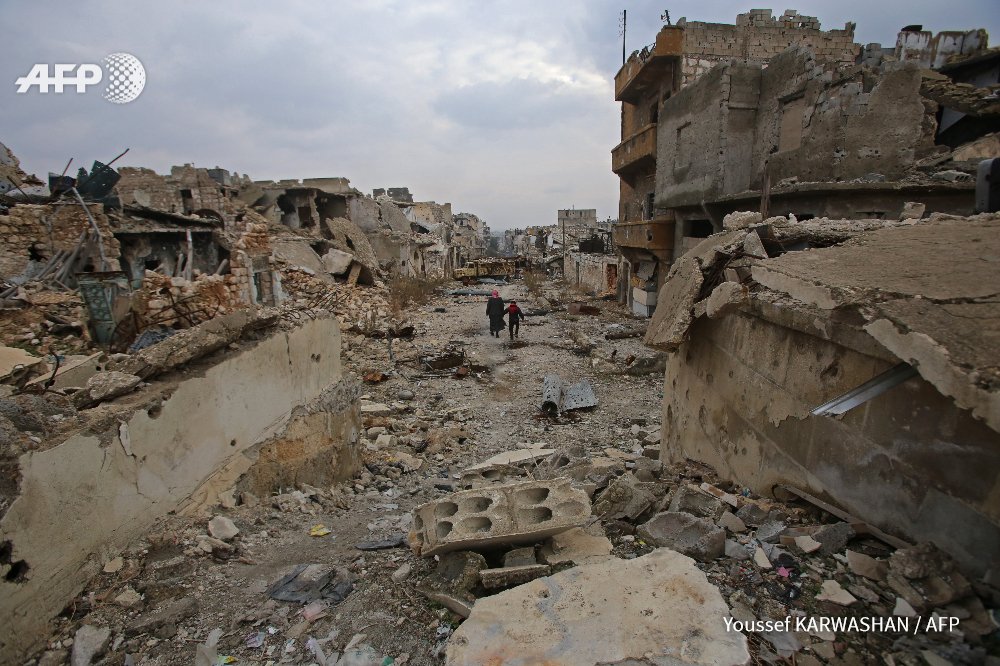
SYRIA - Syrians walk down a destroyed street in Aleppo's al-Akroub neighbourhood. By Youssef Karwashan #AFP:
image via Frédérique Geffard @fgeffardAFP, 17 December 2016
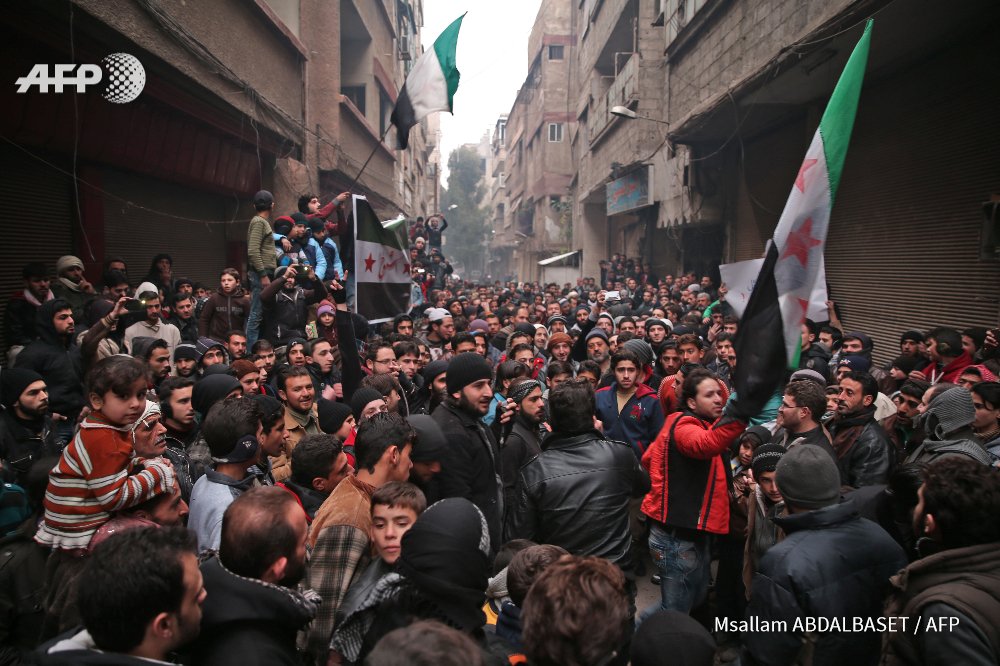
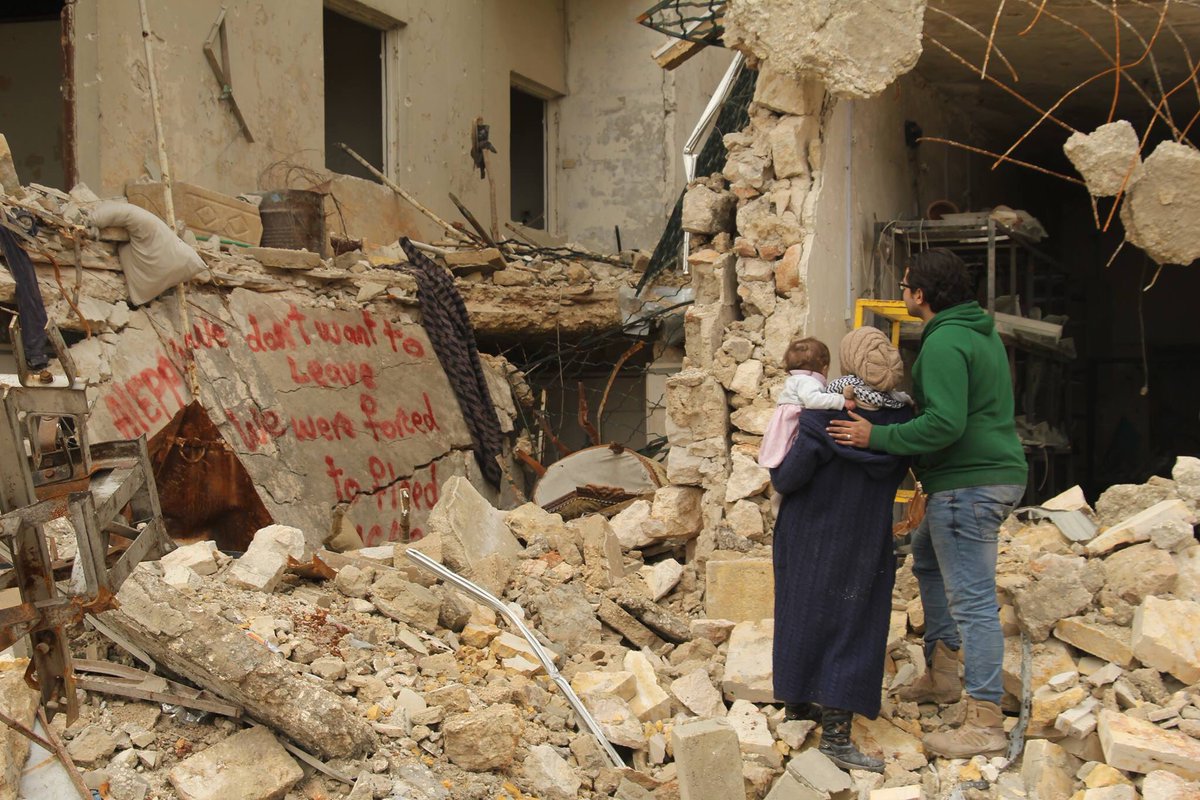
we don't want to leave ..we were forced to flee #Aleppo PH: Abd Alkader Habak: image via zakaria abdelkafi @zakria_alkafi, 17 December 2016

SYRIA
- Demonstrators gather in the rebel-held town of Saqba, in solidarity
with the inhabitants of Aleppo. By Msallam Abdalbaset #AFP: image via AFP Photo Department @AFPphoto, 17 December 2016

we don't want to leave ..we were forced to flee #Aleppo PH: Abd Alkader Habak: image via zakaria abdelkafi @zakria_alkafi, 17 December 2016
Fela Anikulapo-Kuti and Egypt 80: Beasts of No Nation, Live at the Zenith, Paris, 1984
ReplyDelete